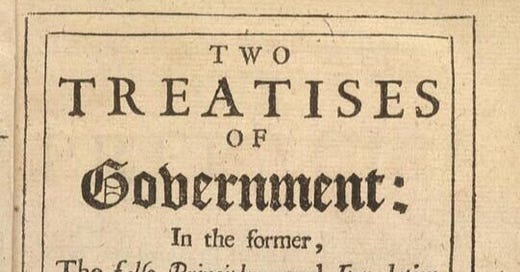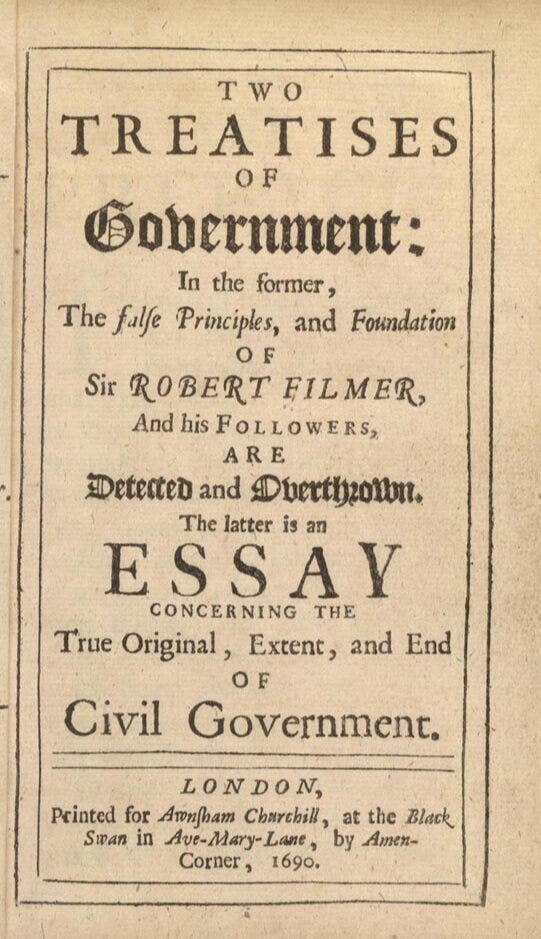In the Second Treatise of Government, John Locke’s justification of private property eventually leads to the surprising conclusion that “men have agreed to a disproportionate and unequal possession of the earth.” This essay will reconstruct his argument, problematizing it along the way, by first elucidating the justification of private property in the state of nature. Then, I will present the restraints on the individual’s acquisition of property and therefore on inequality during this pre-civilized state, before ending with an analysis of how the introduction of money renders these restraints impotent.
Private Property in the State of Nature
The first dilemma Locke must wrestle with, given his Christian world view, is how there can be any legitimate private property at all if God has given all of humanity dominion and, therefore, ownership over nature. Constitutive in the notion of private property is the exclusionary access of the owner. How can one exclude every other human from a part of their God-given inheritance?
Locke’s justification proceeds in three steps. First, he asks us to examine that our physical bodies are not natural objects owned by mankind but ones that we undeniably own privately. It follows from this then that our actions and, more specifically, acts of labor are also our own. Lastly and more questionably, Locke concludes that whatever our labor operates upon in nature also becomes our own. “Whatsoever then he removes out of the state that nature hath provided, and left it in, he hath mixed his labour with, and joined to it something that is his own, and thereby makes it his property.” That is not to say any member within any community can legitimately acquire communal resources at will, but merely that the human can take from nature at will through labor. While this clarification renders Locke’s argument more reasonable, the intuition behind it poses a question for Locke’s third step: why does labor turn a natural object, which is the communal property of mankind, into one’s own? To this question I will now turn.
Locke makes an appeal to natural law, laws whose validity are given a priori by reason examining the human condition. Because humanity is God’s creation, these laws are also commanded by, or at least conform to, God’s will. These laws are accessible through reasoned examination alone but their integrity comes, at least partially, from an appeal to divinity. This will become important as, I will soon show, Locke’s third step not only justifies private property but transforms it into an activity commanded by God.
Locke’s first appeal to the human condition is to self-preservation: “men, being once born, have a right to their preservation, and consequently to meat and drink, and such other things as nature affords for their subsistence.” He asks us to consider what would happen if labor on nature did not lead to private possession. We would literally have to get the individual consent of all other human beings to, for example, pick berries off a wild bush. “If such a consent as that was necessary, man [would have] starved.”
Locke’s second appeal to the human condition is to human flourishing. “God, who hath given the world to men in common, hath also given them reason to make use of it to the best advantage of life, and convenience. The earth, and all that is therein, is given to men for the support and comfort of their being.” His reasoning must be: it is within our nature not only to subsist but also to flourish. This would be impossible unless we could use a certain number of objects as we wish while excluding others from interfering.
Locke’s third appeal to the human condition is to collective subsistence and flourishing. “Labour makes the far greatest part of the value of things we enjoy in this world; and the ground which produces the materials, is scarce to be reckoned in, as any, or at most, but a very small part of it” and therefore “he who appropriates … by his labour, does not lessen, but increase the common stock of mankind.” If humanity as a whole, and not just a lone individual, is to subsist and flourish we have to acquire objects which are valuable to us. The value of objects come more from labor than natural production; he provides the example that uncultivated land produces only one percent of what cultivated land does. This is not a justification of private property per say, but a justification of labor and perhaps an implicit argument of why it should be rewarded with private property.
By drawing upon the subsistence and flourishing of the individual and collective, Locke appeals to the natural law which is inexorably intertwined with God. Not only does he manage to justify private property morally but he elevates its acquisition to a divine commandment:
God, when he gave the world in common to all mankind, commanded man also to labour, and the penury of his condition required it of him. God and his reason commanded him to subdue the earth, i.e. improve it for the benefit of life, and therein lay out something upon it that was his own, his labour. He that in obedience to this command of God, subdued, tilled and sowed any part of it, thereby annexed to it something that was his property, which another had no title to, nor could without injury take from him.
Natural Restraints on Inequality
“The same law of nature, that does by this means give us property, does also bound that property too.” That is to say, just as the natural law justifies property, it also contains restrictions on acquisition and, therefore, inequality.
Property is restrained by the limitations of one’s labor: ”As much land as a man tills, plants, improves, cultivates, and can use the product of, so much is his property.” This tautology might seem uninteresting and redundant in the state of nature, but will soon be important when money expands what one may consider “one’s labor”. For now, it is noteworthy that this limitation restrains the bounds of all property but cannot produce, as the next two can, illegitimate property.
Legitimate property is restrained by spoilage. Locke observes that the true necessities of life are often consumable perishables such as food. Therefore, property is illegitimate if it spoils before being consumed, as it shows one has taken more than one needed for subsistence and flourishing. Why might this be the case? He makes an appeal to the same natural law that justified property: “As much as anyone can make use of to any advantage of life before it spoils, so much he may by his labour fix a property in: whatever is beyond this, is more than his share, and belongs to others. Nothing was made by God for man to spoil or destroy.”
Legitimate property is also restrained by the remainder left for others. Property is only legitimate in so far as after the act of acquisition “there is enough, and as good, left in common for others.” But what does “good” and “enough” mean? Does one need to leave enough for everyone else to flourish or merely to subsist? Surprisingly, the criteria is more stringent than both of these conditions: he needs to leave “room for as good, and as large a possession (after the other had taken out his) as before it was appropriated.” That is to say, the act of acquisition entrench upon the anyone else’s potential for flourishing. It is not just how much they will legitimately acquire to flourish which needs to be respected, but the largest amount of property that others can legitimately acquire.
The boundaries of legitimate property seem both too broad and too narrow. It is too broad in that it is not clear what constitutes labor. Does watering a tree once found in a forest render that tree and all its fruits mine? Behind this critique of the ambiguity of labor lies a deeper suspicion. Value is created mostly by nature in many useful objects such as pears or oil. It is not clear why extractive labor deserves to be awarded with property in these cases. It is too narrow in that the third restraint is suffocating. It is unclear why, as an industrious individual, my property should be limited not only by what others need to subsist and flourish but also by the maximum property they can legitimately possesses. It is even more unclear, how one is supposed to follow this restraint practically. These problems will balloon and become irresolvable with the introduction of money.
The Introduction of Money
The introduction of money – imperishables such as gold or silver – made larger forms of inequality possible. Much of this inequality is justified because, so Locke reasons, we have a “tacit agreement” to put value upon money. Since the acquisition from nature is just, and the agreement to use money is just, whatever inequality follows from it must also be just. Therefore, inequality is bounded by no more than the same restraints from the state of nature. We must investigate now, how money renders these three restraints impotent.
First, money expands, or at least facilitates the expansion of, what constitutes “my labor”. “Thus the grass my horse has bit; the turfs my servant has cut … become my property, without the assignation or consent of anybody.” Through money I can purchase property, such as a horse or a stock portfolio, whose acquisitive actions count as my labor and thus generate more property. I can also purchase the labor power of others as my own. This drastically weakens the first restraint.
Second, money, being an imperishable, allows me to store value without it ever spoiling. This renders the restraint from spoilage impotent.
But what about the third restraint, that I have shown to be quite restrictive already in the state of nature? Surely great material inequalities limit not only the potential but also the actuality of subsistence and flourishing by, say, corrupting political institutions? Locke remains quiet on this point. It is unclear how the third restraint is supposed to function in civil society, since any acquisitive action almost always limits the potential for another’s property, a potential that due to the imperishable characteristic of money is now infinite. A consistent Lockean defense would be that these restraints only limit the transfer of nature to private property. Any property gained from trading with others, which dominates civil society, is justified because it is consensual and does not fall under the dominion of any natural restraint.
But even to this charitable defense, one may object: should there not be new restraints on property acquisition from trade derived from the natural law just as there were for acquisition from nature? To put the critique more broadly: if Locke defends inequality as long as acquisitive behaviors remain within the bounds of certain restraints derived from the state of nature and are facilitated by the consent of money or trade, one can simply question whether money or trade is consensual. It seems that the agreement to use money, if there ever was such an agreement, was ill informed on the potential material and formative consequences. Therefore, one does not consent to using money or entering into civil society any more than one consents to living in the state of nature. To rescue Locke within his own framework, the restraints placed on property in civil society cannot be the same restraints derived in the state of nature and must be re-derived from examining how the natural law – the subsistence and flourishing of the individual and collective – operates under the logic of civil society.





